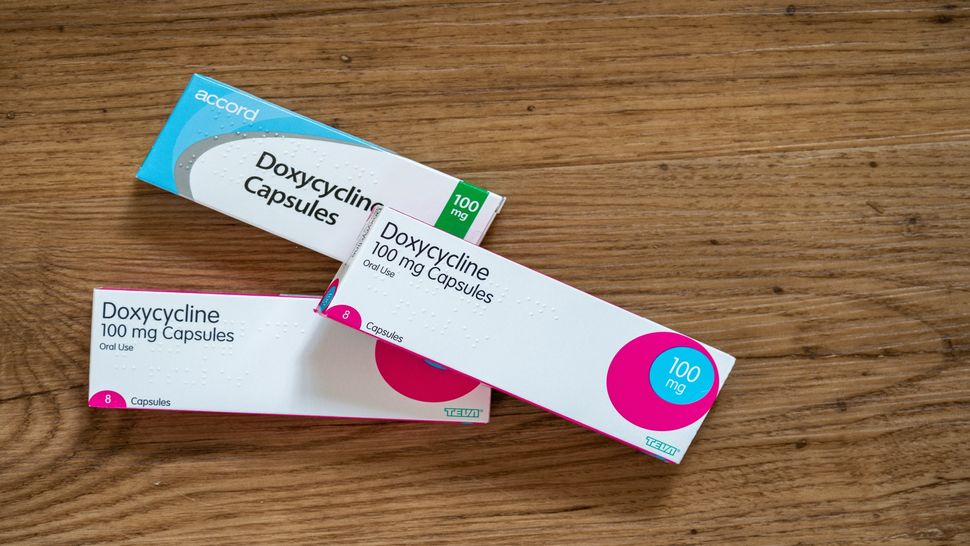The Centers for Disease Control and Prevention (CDC) will soon recommend that some people use “morning-after” antibiotics to lower their risk of STIs. Bacteria-killing viruses may one day be able to do this without contributing to the development of antibiotic resistance.
On a huge, green bacterial cell is a computer-illustrated bacteriophage in orange and red. The use of bacteriophages, or phages, to cure bacterial illnesses is a promising future use of this virus-bacteria interaction. In the United States, bacterial STI rates have skyrocketed in recent years. Antibiotics are used to combat the rising rates of chlamydia, gonorrhoea, and syphilis, but they come with a catch: antibiotics promote the development of antibiotic resistance in microorganisms. Therefore, it will be essential to develop new strategies for preventing STIs and decreasing the overuse of antibiotics. Viruses can stop sexually transmitted infections. However, we are now in a difficult situation.

Doxycycline post-exposure prophylaxis (PEP)
Doxycycline post-exposure prophylaxis (PEP), also known as “doxy-PEP,” is an antibiotic treatment used to prevent sexually transmitted infections (STIs). The CDC is recommending doxycycline to high-risk individuals after unprotected intercourse. Doxy-PEP is effective against gonorrhea, chlamydia, and syphilis, but some experts worry it may increase antibiotic resistance. Phages, or bacteriophages, are viruses that can destroy bacteria, and while they are theoretical at the moment, they hold promise for reducing antibiotics needed for STI prevention and treatment. University of Helsinki phage researcher Mikael Skurnik believes that phage and antibiotic combination therapy could help prevent STIs by working together to treat bacterial infections.
Advantages
The CDC is considering guidelines for the prescription of doxy-PEP, a drug used to treat antibiotic-resistant bacteria, until November 16. Some scientists are concerned about the potential for increased antibiotic resistance if phages are used. Phages can infect bacteria, multiply inside them, and cause cell explosions. However, phage therapy’s clinical applicability is limited, and only after all other therapeutic options have failed have phages been tested in human clinical trials in the United States. Phage treatment may be a viable alternative to antibiotics if clinical studies validate its safety and benefit. Phages may be more effective prophylactics than doxy-PEP and other antibiotics due to their ability to kill resistant bacteria and the fewer drugs required to treat infections. However, bacteria may develop resistance to certain phages, and a combination of phages may be needed to effectively eradicate the bacterium. Phages only target specific bacterial species or strains, posing less threat to the microbiome than antibiotics. Doxycycline, an all-purpose antibiotic, may kill off beneficial bacteria while allowing opportunistic pathogens to thrive uncontrolled. Weaning off antibiotics may help avoid health risks associated with changing the microbiome, but it is difficult to draw solid conclusions regarding the safety of phages due to their limited usage.
Virus-PEP Use Impasses
Some problems with phage treatment for STIs are that it can not go after bacterial STIs, there are not any phages that can be used to make a phage combination, and the focus is on model bacteria instead of STI-causing bacteria. Phage engineering may be an option if researchers cannot identify naturally occurring phages that infect STI-causing bacteria. Phage-targeting phages, such as prophages, can be artificially modified to destroy their hosts.
In the US, researchers have discovered a new strain of drug-resistant gonorrhoea, which could be a national pattern. Phage therapy for STIs is still years away, and doxy-PEP is causing concern. Microbiologist Green warns that if phages become drug-resistant, there are no options for treating these infections. Regular monitoring of those receiving doxy-PEP is crucial to ensuring resistance. Phage therapy for STIs is still years away, and if resistance becomes a concern, there are no viable treatments.
For further information, read this article:https://www.livescience.com/health
Read our previous articles: https://scitechupdate.com/
https://scitechupdate.com/index.php/zinc-should-get-from-food-not-supplements/
https://scitechupdate.com/index.php/three-nobel-prizes-try-to-cover-all-of-science/
https://scitechupdate.com/index.php/the-most-populated-cities-in-the-world/
https://scitechupdate.com/index.php/aromas-and-odors-decoding-the-insect-brains-interpretation/
https://scitechupdate.com/index.php/pig-kidney-xenotransplantation-is-thriving-in-human-body/
https://scitechupdate.com/index.php/huaweis-new-smartphone-challenger-to-apple/
https://scitechupdate.com/index.php/israel-advances-cancer-treatment-with-genomic-profiling/https://scitechupdate.com/index.php/stomach-cancer-causes-signs-and-treatment/
https://scitechupdate.com/index.php/james-webb-telescope-captures-newborn-sun-like-star/
https://scitechupdate.com/index.php/oxygen-28-unstable-magic-isotope-that-defies-expectations/

